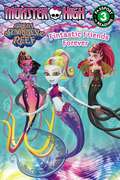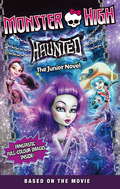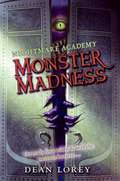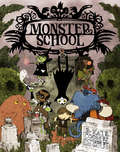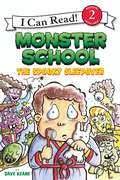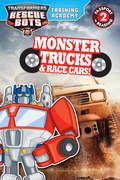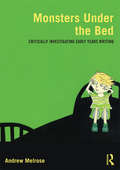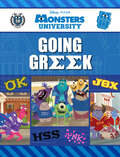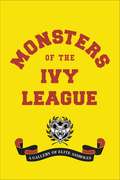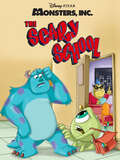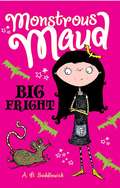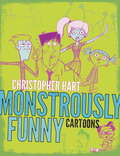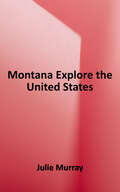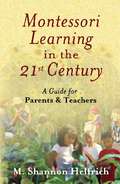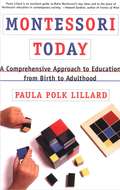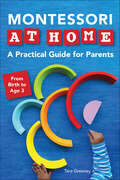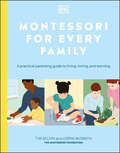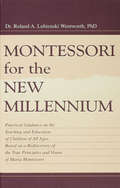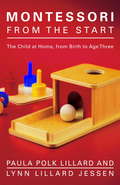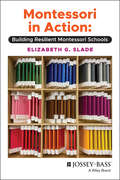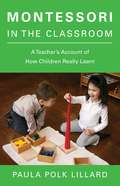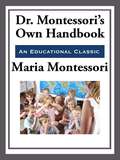- Table View
- List View
Monster High: Fintastic Friends Forever
by Margaret GreenLagoona Blue and her ghoulfriends are on a creeperific undersea adventure in the Great Scarrier Reef. But not everything is going swimmingly. For some reason, Lagoona's old friend Kala is acting not-so-friendly. Something fishy is going on! Can the friends work it out?Passport to Reading Level 2© 2016 Mattel. All Rights Reserved.
Monster High: Freaky Fusion
by Perdita FinnDuring the Bite-Centennial, the ghouls discover an old scientist's workshop and travel back two hundred years to the beginning of Monster High. But when they try to get home, they go through a vortex that fuses some of the ghouls together! With the help of the Hybrids, the new monsters in school, they learn how to control their combined flaws and together face their greatest challenge . . . saving Frankie! This novelisation of the Monster High animated special includes an eight-page full-colour insert of fangtastic images!
Monster High: Haunted
by Perdita FinnThe next book in a series of junior novels from the freaky-fabulous world of Monster High! Includes an eight-page full-colour insert.
Monster Madness (Nightmare Academy #2)
by Dean LoreyCharlie Benjamin is gifted. His nightmares have the power to open portals to the Netherworld, allowing fearsome creatures to enter this world. Only place for Charlie--Nightmare Academy, where he and his classmates will learn to control their powers.
Monster School
by Kate CoombsTwilight's here. The death bell rings. Everyone knows what the death bell brings—it's time for class! You're in the place where goblins wail and zombies drool. (That's because they're kindergartners.) Welcome to Monster School. In this entertaining collection of poems, award-winning poet Kate Coombs and debut artist Lee Gatlin bring to vivid life a wide and playful cast of characters (outgoing, shy, friendly, funny, prickly, proud) that may seem surprisingly like the kids you know . . . even if these kids are technically monsters.
Monster School: The Spooky Sleepover (I Can Read Level 2)
by Dave KeaneNorm is just plain normal until he finds himself in a new school where all his classmates are monsters! When his school hosts a sleepover, Norm is nervous that he'll be too scared to fall asleep. But it's not the monsters that he's scared of—it's sleeping away from home!Join Norm in this wacky, easy-to-read I Can Read story about learning to fit in. Reluctant readers, boy readers, girl readers, monster readers—any beginning readers—will enjoy the wonderfully silly story and the fun illustrations. This is a level two I Can Read! book geared for kids who read on their own but still need a little help.
Monster Trucks and Race Cars! (Transformers)
by Trey KingToday the Rescue Bots are going to learn about the fastest cars and the biggest monster trucks! They'll explore some engines, check out big tires, speed around racetracks, and more! Want to race along for the adventure?The Rescue Bots are here to learn about Earth the fun way! This new narrative series presents fun facts and photographs of children's favorite topics, alongside characters from the popular toy and cartoon brand: Transformers Rescue Bots. This new form of nonfiction promises to be both educational and entertaining for any fan. Passport to Reading Level 2 ©2017 Hasbro. All Rights Reserved.
Monster and the Magic Umbrella
by Ann Mariah Cook Ellen BlanceWhat will Monster do with his magic umbrella?
Monsters Under the Bed: Critically investigating early years writing
by Andrew MelroseMonsters Under the Bed is an essential text focussing on critical and contemporary issues surrounding writing for ‘early years’ children. Containing a critically creative and a creatively critical investigation of the cult and culture of the child and childhood in fiction and non-fictional writing, it also contains a wealth of ideas and critical advice. This text dynamically explores the issue of picture books, literacy and writing for early years children with a wider view on child-centred culture, communication and media. Internationally recognised as an expert in the field, Andrew Melrose encourages academics, researchers and students to examine the fundamental questions in writing for and addressing ‘early years’ children, through an exploration of text and images. Accessibly written and lively in its approach, this book includes: an accessible and critically important challenge to the latest international academic research and debates in the field of children’s literature and creative writing an extensive investigation of early years writing and reading a pathway to developing critical awareness of children’s literature, allowing students to develop their own critical ability and writing skills constant ‘checkpoints’ throughout, in which the reader is encouraged to reflect on critically creative and creatively critical development. Providing a coherent and pedagogical approach, this compelling text will be an indispensable resource for critics, writers and students interested in children's writing, as well as those on Creative Writing, Children's Literature and English BA and MA programmes. It will also be of great interest to those in teacher training, PGCE students and for those studying at Doctoral and Post-Doctoral level.
Monsters University: Going Greek
by Calliope GlassAll the best monsters want to go to Monsters University, and once they get there, all the BEST of the best want to go Greek! How about YOU? Are you a goth like the sisters at Eta Hiss Hiss, or a jock like the brothers of Jaws Theta Chi...or maybe you're a scrappy newcomer, like the misfits at Oozma Kappa? Learn what it takes to join one of MU's fraternities or sororities — meet the Greek Council, choose your house, and train for the Scare Games with this handy full-color guide! Get ready to GET YOUR SCARE ON!
Monsters of the Ivy League
by Ellis Weiner Randy Jones Steve RadlauerFirst stop: Harvard or Yale or Princeton or...Next stop: Wall Street riches...house on the Vineyard...vineyard with a house...a Nobel Prize...Not so fast.Everybody knows that the schools of the Ivy League-universally touted as the pinnacle of American higher education-have graduated countless political leaders, corporate titans, and global power brokers. But did you know these schools have also produced murderers, warmongers, traitors, plagiarists, slave traders, pederasts, and every other variety of moral reprobate?Whether you're a high school student grinding away in the hope of gaining admission to one of these institutions, a parent propelling a child toward Ivy glory, a current Ivy League undergraduate wondering "What the hell is this place?"-or even an Ivy League alum, professor, administrator, or dropout-this book was written specifically for you. As a warning. Because there are certain things-monstrous things-that go unmentioned in the catalog, campus tour, or employment package.And if your Ivy League application was rejected, here's compelling and consoling evidence of how lucky you are.
Monsters, Inc.: The Scary School
by DISNEY BOOK GROUPMike Wazowski's job is to make kids laugh. But when he goes to work one day, he learns some terrifying news: Monsters, Inc. employees have to go back to school for safety training! And for Mike, school could be a scary place, so he is nervous for the first day of class at his new school. The day before school starts, Mike's best friend and boss Sulley tours the campus with Mike to make him feel better. Will going to school be as scary as Mike remembers, or will he rise above his fears and excel?
Monstrous Maud: Big Fright (Monstrous Maud Ser. #1)
by A. B. SaddlewickWhen Maud’s pet rat, Quentin, escapes in the middle of science class, it’s the very last straw. While Primrose Towers is full of decorous young ladies, Maud is ungraceful and prefers her pet rat to all other company She never quite fit in with the rest of the students and has been a nuisance one too many times. Maud is transferred from prim and proper Primrose Towers to dark and mysterious Rotwood Middle School—much to the delight of her teacher, classmates, and her perfect twin, Milly—but what is in store for Maud at Rotwood? There is something strange about the students and teachers. Everyone is dressed as if it’s Halloween and the school motto is “Because We Scare.” Maud learns two very important things on her first day at Rotwood: first, all of the students and teachers are monsters and second, she’s finally found a place where she feels like she belongs. While Primrose Academy rejected Maud’s differences, Rotwood allows her to embrace them. Even though she’s not a monster, Maud must make everyone believe she is in order to stay at Rotwood with her new friends. Monstrous Maud: Big Fright is a great alternative to princess books for middle grade readers. It is full of silliness and monster fun—along with likeable characters and a great twist at the end.
Monstrously Funny Cartoons
by Christopher HartA monstrously big guide that teaches you how to draw the silliest and scariest zombies, vampires, witches, ghouls, and other creepy cartoon favorites.Aspiring artists learn all the drawing tips and tricks they need to create laugh-out-loud renditions of their favorite monsters and scary creatures direct from cartooning master Christopher Hart. This jam-packed cartooning guide shows readers how to capture the lighter side of these creepy creatures by combining them with Hart's incredibly popular cartoon drawing style! Taking readers step-by-step through each monster type, Hart demonstrates how to draw everything from terrifyingly silly heads to wacky comic strip-like scenes of monstrous menace. Chockful of hints, humor, and horror, The Ginormous Book of Monster Cartoons is guaranteed to be a real scream for aspiring and professional artists, as well as all fans of things that go bump in the night.
Montana (Explore the United States)
by Julie MurrayInvite your students to explore the state of Montana in this comprehensive title! <p><p> Informative, easy-to-read text draws in reluctant readers, while vibrant, oversized photos showcase the beauty and diversity of this state. Readers journey through Montana as they learn about its history, cities, land features, animals, industries, famous people, and more! <p><p> A "Tour Book" spread highlights kid-friendly things to do in Montana. Other features include a table of contents, fact boxes, a timeline, regional and state maps, a facts page with vital information, a glossary with phonetic spellings, and an index. Up-to-date population statistics are taken from the 2010 US census. In this title, students will find valuable information for first reports! <p><p> Aligned to Common Core Standards and correlated to state standards.
Montessori Learning in the 21st Century
by Andre Roberfroid M. Shannon HelfrichThis book fills a growing demand for contemporary books on Montessori education and how it applies to childhood learning and education in the 21st Century. Dr. Maria Montessori developed her theories and methods for educating young people more than a hundred years ago. Today, much of Dr. Montessori's empirical findings on how the childhood brain develops and works has now been proven accurate by recent neurological/ psychological studies on childhood learning. M. Shannon Helfrich shares many experiences from her nearly 40 years as a Montessori teacher and teacher's trainer to help parents and Montessori teachers understand the factors that influence understanding and learning for children throughout their years of development. In a lay person's terms, the author explains how the brain develops and why interaction with the environment is essential at specific points in a child's development. She includes diagrams and photographs throughout the book.The author also links Montessori's findings with the latest neuropsychological research, weaving back and forth between the centuries, making a strong case for the ongoing viability of a Montessori education in this brave new world. Helfrich offers many anecdotes from classroom experiences with children that support these findings. In the beginning of her book, Helfrich asserts that Dr. Montessori was one of the great thinkers in the 20th century who changed the understanding of a child's nature regardless of race, class or culture, and ultimately, an evolved understanding of our humanness. This book confirms Dr. Montessori's pivotal role in the history of childhood education internationally.
Montessori Today: A Comprehensive Approach to Education from Birth to Adulthood
by Paula Polk LillardPaula Lillard, director of a Montessori school ranging in age from 18 months to fifteen years, provides a clear and cogent introduction to the Montessori program for the elementary and later years. In detailed accounts, Lillard shows how children acquire the skills to answer their own questions, learn to manage freedom with responsibility, and maintain a high level of intellectual stimulation by using the Montessori method. This is an essential handbook for parents and teachers who have chosen the Montessori alternative for the older child.From the Trade Paperback edition.
Montessori and Early Childhood: A Guide for Students
by Susan FeezEarly childhood education across the world has been influenced by the pioneering work of Maria Montessori, and this book provides a complete overview of Montessori pedagogy and practice. It considers the Montessori approach within the context of early childhood education and care, and examines it in the light of new insights from the fields of neuroscience and child development. By helping the reader understand the influence of Montessori on contemporary early years policy and practice, the book outlines ideas relevant to all early years settings, and suggests ways for all early childhood educators to apply these ideas in practice. The book looks in detail at: - the Montessori story - the child as worker and the adult as observer - developing independence and concentration - using the senses to build the foundations for learning - early communication and language - early mathematics - cultural knowledge and understanding - Maria Montessori, and other early childhood pioneers Within each chapter are definitions of the key concepts of the Montessori approach, questions for reflection and discussion, activities and suggestions for further reading. This book focuses on the 3 to 6 age range. Susan Feez is a Lecturer in the Faculty of Education at the University of New England, Armidale, Australia.
Montessori at Home: A Practical Guide for Parents
by Tara GreaneyUse the Montessori Method at home to enhance your child's confidence and development—for ages 0-3This practical guide shows parents how to apply the Montessori Method at home with easy-to-implement activities and tips designed to build a child's social, emotional, cognitive, and moral growth. This Montessori workbook provides valuable training for parents in an easy-to-follow, chronological format that follows the age and development of the child.The Montessori difference—The Montessori philosophy respects the child's choices, with an emphasis on self-direction and independence, which helps promote a child's fullest potential.Milestones and developmental goals—Gain insight on which milestones to look for, and learn games and exercises to engage in with your child, each earmarked for a specific age and modified to meet the developmental goals for each age.Letting your child lead—Unlike typical toddler parenting books, Montessori is about following the child. By observing, respecting, and giving freedom to your child, the guide shows you what they are ready for and can accomplish.Make Montessori at Home your go-to guide for nurturing your child's self-esteem and helping them thrive.
Montessori for Every Family: A Practical Parenting Guide to Living, Loving and Learning
by DKThis parenting book shows you how to make magical Montessori memories — every day.This beautiful, modern Montessori book for parents outlines the key principles of this parenting approach and shows you how you can easily apply this at home. It provides a valuable starting point for parents to help them create a family life inspired by the ethos of Montessori.This practical parenting guide makes Montessori accessible to every parent and child, regardless of time pressures and resources. It includes: • Outlines of the Montessori principles clearly and succinctly: respect, freedom, curiosity, creativity, responsibility and independence. • Examples on how to apply these principles to everyday life – with sections on breakfast time, school/daycare drop off, school/daycare pick up, playtime, meal times, homework time, bath time and bedtime. • Demonstrations of how to apply Montessori techniques to an older child new to Montessori and how to flex and build on the techniques as your child grows up.Montessori is a unique educational philosophy created by Maria Montessori that fosters the growth of the whole child. From enjoying nature together to free time and weekends, every aspect of family life is an opportunity for meaningful engagement with your child. Montessori For Every Family offers you pragmatic, real-life advice, suitable for children of all ages, showing you how easy and natural it is to create a nourishing and empowering environment at home for everyone.Even if your child won&’t go to a Montessori school, a Montessori home can still be an invaluable bridge to reinforcing your child&’s natural curiosity and setting the foundation for lifelong learning. This is the only Montessori book that recognizes that most parents don&’t have the time and resources to overhaul their lives to fully embrace a parenting philosophy, but instead need practical, immediate guidance that is effective. "You will want to refer to this book again and again." Paul Epstein, PhD, Designs of Lifelong Learning
Montessori for the New Millennium: Practical Guidance on the Teaching and Education of Children of All Ages, Based on A Rediscovery of the True Principles and Vision of Maria Montessori
by Roland A. Wentworth Felix WentworthAlthough Montessori's name is almost universally known in education circles today, and there are countless nursery schools throughout the world using the "Montessori Method," the real core of her thinking has remained largely misunderstood. Most people regard the method as a system for the education of very young children. And most who have some direct experience of it, either as parent or teacher, would regard it as involving a certain set of procedures and specialized educational materials with clear and elaborate instructions for their use. However, the essence of Montessori's philosophy of education is in reality far broader than this, and contains a powerful message for educators everywhere. What is less well-known about Montessori's work is that she began by establishing the effectiveness of her approach at the pre-elementary level, but also strongly encouraged the extension of her method to the higher levels of education. Wentworth's purpose in writing this book is to elucidate this vital aspect of Maria Montessori's life's work and to show how it applies to real-life teaching situations. She believed that by transforming the process of children's education she could help to transform the attitudes of the adults they will later become, and so those of society and the world at large--a message she promoted as vitally relevant to the future of humankind as a whole.
Montessori from the Start: The Child at Home, from Birth to Age Three
by Paula Polk Lillard Lynn Lillard JessenBased on Dr. Maria Montessori's philosophies for nurturing babies and toddlers, this practical and useful guide is brimming with instructions, anecdotes, and encouragement for raising calm, competent, and confident children—from designing the baby&’s bedroom to encouraging life skills such as dressing themselves and working both independently and collaboratively. What can parents do to help their youngest children in their task of self-formation? How does the Montessori method of hands-on learning and self-discovery relate to newborns, infants, and toddlers? This authoritative and accessible book answers these and many other questions. Its comprehensive exploration of the first three years incorporates the furnishings and tools Dr. Montessori created for the care and comfort of babies. From the design of the baby's bedroom to the child-sized kitchen table, from food preparation to clothing and movement, the authors provide guidance for the establishment of a beautiful and serviceable environment for babies and very young children. They also introduce concepts and tasks, taking into account children&’s ''sensitive periods'' for learning such skills as toilet training. Written in a clear, engaging style, Montessori from the Start is a must-have for every new parent.
Montessori in Action: Building Resilient Montessori Schools
by Elizabeth G. SladeJoin the Revolution! Build a resilient Montessori school Montessori in Action: Building Resilient Montessori Schools delivers a practical and actionable method to provide a strong Montessori experience for all children, families and educators. The first of its kind, this book offers readers a collection of modern and concrete ways to build an equitable and resilient Montessori program, by discussing topics like: Working within the unique, complex ecosystem of Montessori to build a unified community empowered to serve the mission of the school Sharing ways to create a culture of honest conversation based on the values of growth and clarity Offering ways to build strong and resilient systems that will engage the whole community and yield results Perfect for Montessori educators and administrators of all kinds, Montessori in Action will support educators in taking action! This book provides structures, tools and timetables to strengthen and improve schools. It will also earn a place in the libraries of the parents of Montessori children who desire to create and maintain an equitable environment that benefits all students, regardless of their background.
Montessori in the Classroom: A Teacher's Account of How Children Really Learn
by Paula Polk LillardWhat really happens inside a Montessori classroom? How do teachers teach? How do children learn? This fascinating day-by-day record of a year in the life of a Montessori classroom answers these questions by providing an illuminating glimpse of the Montessori method in action.
Montessori's Own Handbook
by Maria MontessoriThis classic best-seller is a reproduction Dr. Maria Montessori's Classic Education Book "Dr. Montessori's own Handbook" originally published in 1914. One of the truly great books on early childhood development, this brief guide instructs parents and teachers on how to use familiar, easy-to-obtain classroom materials to make the home an effective learning environment. The book covers methods for engaging youngsters in learning while stimulating and honing their visual, auditory, and tactile perceptions. An illustrated guide to the use of Montessori classroom materials. Describes how to set up a "children's house" - an environment for learning where children can be their own masters.
